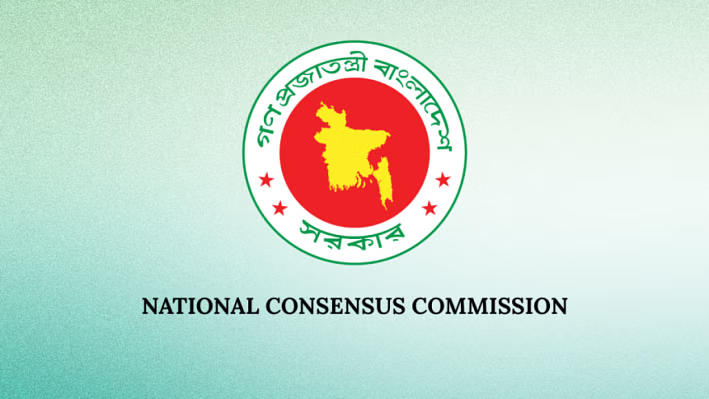The formation of the July Charter is progressing amid significant challenges, as political parties remain divided over key issues.
Under the guidance of Chief Adviser Muhammad Yunus, the National Consensus Commission (NCC) is working to ensure the drafting process remains transparent.
However, deep disagreements among several political parties, including the BNP, Jamaat-e-Islami, Islami Andolon, and the National Citizen Party (NCP), are impeding progress.
So far, only 12 out of the 20 proposed recommendations have garnered agreement from all parties. The remaining eight are still subjects of intense debate, stalling the drafting process and threatening delays in the charter’s completion.
Political parties have a narrow window to submit their opinions, with the deadline set for either today or tomorrow.
A key point of contention is the proposal to introduce a Proportional Representation (PR) system before the next national parliamentary elections. Jamaat, NCP, and Islami Andolon support the PR system.
However, BNP has raised objections, arguing that introducing the PR system would be impractical in a country where the public is still unfamiliar with the Electronic Voting Machine (EVM) system.
The NCC, tasked with finalising the July Charter, has set a deadline of July 31 to gather opinions from all parties before seeking approval for its implementation.
NCC Vice Chairman Ali Riaz confirmed that the draft of the charter has been shared with political parties. While some differences remain, work continues on the 12 recommendations already agreed upon.
He emphasised that if no major objections arise, the implementation process should proceed.
BNP Secretary General Mirza Fakhrul Islam Alamgir acknowledged progress on some issues but pointed out that the PR system remains a significant point of dispute.
He expressed concern about the feasibility of implementing such a system, saying, “How can the PR system be adopted when people don’t understand the EVM?”
While the BNP is willing to cooperate with the NCC, Fakhrul suggested that pushing for the charter’s implementation under current circumstances could prove difficult.
The NCP has also expressed dissatisfaction with the drafting process, criticising the sudden release of the charter’s draft without sufficient consultation on their concerns.
NCP Convenor Nahid Islam stressed that in order for the July Charter to be effective, a legal framework must be established before the elections, with elections based on that framework.
Meanwhile, Jamaat Naib Amir Syed Abdullah Mohammad Taher proposed that the next parliamentary elections be conducted under a caretaker government.
A 5-member selection committee, including the prime minister, leader of the opposition, speaker, deputy speaker (from the opposition), and a representative from the second opposition party, would be responsible for selecting the head of the caretaker government from 12 potential candidates. If no consensus is reached, the decision would be made through rank-choice voting.
Jamaat also argued that only five or six parties have representatives in parliament, while the NCC have representations from over 30 parties.
As a result, Jamaat and several other parties contend that the final decision should be made within the commission rather than parliament.
Jamaat has prepared its own draft, which it intends to submit to the NCC in the next few days. Regarding the July Charter draft, Jamaat leaders have criticised it for being incomplete and containing dangerous sections.
Jamaats Assistant Secretary General Hamidur Rahman Azad further criticised the draft for failing to sufficiently address the significance of people’s movements and uprisings, central to Jamaat’s ideology.
BNP Standing Committee member Salahuddin Ahmed echoed these concerns, calling for more discussions before political parties can reach a final agreement.
Leaders from both the NCP and Jamaat sharply criticised the draft for not adequately reflecting the legal framework necessary for the accord’s implementation.
They called for the legal foundation to be established by July 31, ensuring its implementation before the elections.
LDP Chairman Shahadat Hossain Selim also weighed in, asserting that the draft lacked proper emphasis on the spirit of the Liberation War, focusing too heavily on the events of July.
Despite these ongoing disputes, the NCC remains hopeful that, after receiving political parties’ final opinions, a consensus will be reached, and the July Charter will be finalised by July 31.
The commission faces mounting pressure to resolve these disagreements and implement the charter, which could have significant implications for the country’s political landscape.
On Tuesday, political parties again engaged in fresh disagreements over the July Charter draft, which the NCC had sent to them for feedback by Wednesday.
The BNP expressed support for the charter, while Jamaat and the NCP raised concerns about both the content and the process behind the release of the draft.
The differing positions emerged on the 21st day of the second phase of talks between the NCC and political parties at the Foreign Service Academy in the capital.
Briefing reporters after the meeting, Ali Riaz explained that discussions focused on the provisions for appointing an impartial caretaker government, the auditor general, and the ombudsman.
He noted that the NCC had presented a revised proposal for the caretaker government system, incorporating suggestions from various political parties.
“There is no disagreement on the five-member selection committee proposal. However, discussions are stalled on whether to use the rank-choice voting system,” he said.
“BNP and several other parties have differing views on this matter. The Commission will make a decision after further discussions.”


